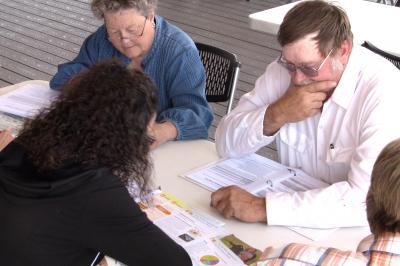NMSU Cooperative Extension Service partners with MSU to bring renewable energy education to the public

New Mexico State University's Cooperative Extension Service has partnered with Montana State University on a program that gives agents - and the public - the tools necessary to address the renewable energy needs of their communities.
This summer, county extension agents received training on E3A: Exploring Energy Efficiency & Alternatives developed by the Montana State University's Cooperative Extension Service. The goal of the training was to help agents familiarize themselves with the tools and resources available to help them develop programming and workshops for their communities, and also enhance their understanding of renewable energy and energy conservation.
"Renewable energy and energy conservation is undoubtedly going to continue to be an important topic in the future and the land-grant university and Cooperative Extension Service needs to be engaged in that process," said Jon Boren, Associate Dean and Director of the New Mexico Cooperative Extension Service. "That is why we decided to collaborate with Montana State University's Cooperative Extension Service. They have been in the process of developing extension materials on renewable energy and energy efficiency, specifically designed for extension faculty. This has really developed into a rewarding collaboration."
Montana State University has developed a toolkit that contains fact sheets on various topics related to renewable energy such as small wind, solar hot water, solar electricity, micro-hydropower, anaerobic digesters, biodiesel, energy management for the home and farm.
County extension agents can use the toolkits to custom design programs or workshops in their counties, whether that be one-on-one training, a short course or an all-day workshop.
"Our training is designed to help faculty start working with constituents to address their energy needs," said Sarah Hamlen, Energy Education Associate Specialist for MSU. "We know there is demand for energy information and that people are hearing a lot about renewable energy from media and other sectors. They have questions about what these systems are, how they work and how to know if a system would work for them. This training is really to help our Extension field faculty address those questions and give people good resources that are non-biased and research-based."
Hamlen said the toolkit is designed to meet people's busy schedule, if they do not have the time to attend a lengthy workshop. That is why the public has access to all the fact sheets on different technologies in the toolkit online at http://www.e3a4u.info/. At this website, there are also links to places for additional information as well as a bibliography of all the sources used to create the fact sheets.
Boren said that in the past couple of years county extension agents have noticed that more and more people have requested information on renewable energy and energy efficiency, which prompted the New Mexico Cooperative Extension Service to partner with Montana State University.
"Our primary objective is to introduce the curriculum and host of fact sheets and information so our faculty can become accustomed to the materials that they might be asked about throughout the state," he said.
He added that the U.S. Department of Agriculture's National Institute of Food and Agriculture and the Western Extension Directors' Association have identified renewable energy as an important need for Extension to engage in.
The majority of the information in the toolkit can pertain to any regions in the country, though there are a few that are customized specifically for Montana. NMSU Extension specialists are reviewing the information now to see how they can customize some of the fact sheets to meet the specific needs of people in New Mexico and the Southwest.
Along with NMSU's and MSU's Cooperative Extension Service partnership, the New Mexico Cooperative Extension Service and the College of Engineering have also partnered together to develop educational materials related to renewable energy.


